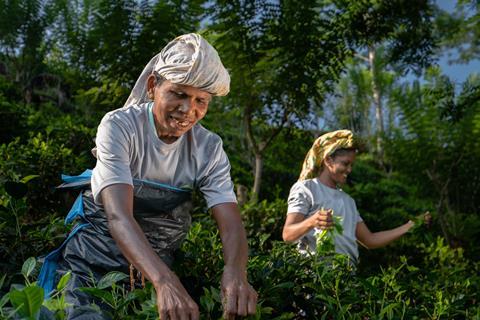
A legacy tea estate in Sri Lanka is trying to bypass traditional supply chains models with a “farm to table” approach that focuses on workers’ rights.
Devagiri Estate, which has supplied tea to European and Middle Eastern markets for decades, has set up its own brand that champions fair wages and workers’ rights by bypassing the traditional tea selling and distribution processes – in which estates sell their tea to brokers at auction before exporters blend them and sell them to importers and only then wholesalers in the end country.
The company’s owners, Roshana Gammampila and Mike Bailey, aim to “revolutionise the tea supply chain by eliminating middlemen, ensuring fairer value distribution, and more profits going back to the growing community” by selling straight to retailers.
“The standard supply chain is too long and the value is eroded by various middlemen”, Gammampila said. “Like wine, it should be possible for tea to be sold farm to table, or at the very least for the supply chain to be shrunk substantially.”
Devagiri is currently in talks with UK retailers. It already supplies its tea to European and Middle Eastern markets, and it has landed big B2B contracts in UK hospitality including with JKS Restaurants group.
The company believes it could up wages for its workers under the “farm to table” model. It would also have more control over its prices at a time when benchmark auction prices have been rising due to unfavourable climate conditions.
Auction prices for black tea from northern India, which shares a similar profile with Sri Lankan tea, were around 30% higher in September than in the same month last year. In Sri Lanka, the average auction price in Colombo was about $4.15/kg as of October – around double the price compared to October 2021, before the country’s economic crisis.
“We don’t expect quick success, but we do believe change is possible, and people like Teun van de Keuken, Tony’s Chocoloney’s founder, have demonstrated that eventually, the market listens,” Gammampila said.
She added: ”One kg of tea sells for £3 at the start of the supply chain and just two grams – one cup – sells for the same amount in a UK restaurant at the end of the supply chain. This is because, in this chain, there are usually about five players, and the impact is of course that too little goes back to the people who produce the tea.
”As a result, for over 150 years, entire communities have been locked in a cycle of poverty and stunted social mobility; with the impacts of high rates of debt, suicide and alcoholism and low rates of educational attainment.
”To add insult to injury, the industry is awash with charitable programmes and meaningless ethical badges that claim to help these communities. They don’t want help. They work hard and they deserve the dignity of fair reward, not the insult of charity instead of fair reward.”



















No comments yet